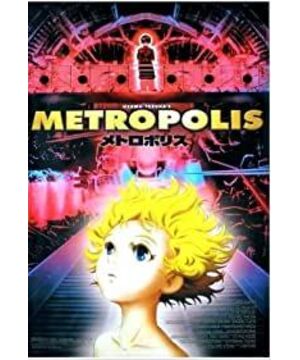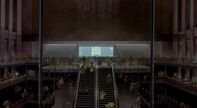Metropolis is an animated film directed by Lintaro and written by Tezuka Osamu and Otomo Keyang. This configuration is not to be called luxurious. The collision between Tezuka Osamu, who is optimistic about the machine, and Otomo Keyang, who is pessimistic and cautious, is also the main point of this film. It's interesting to watch, but after watching it, I was a little surprised but deeply regretful.
1. A long and sloppy plot
The common Japanese story of Boy meets girl is vividly reflected in this film. Even at the end, it is also about the emotional development of boy and girl. The big boss also has his own adopted son CP branch (like a lost dog in a polyamorous love that ends up getting nothing) w) Although it is a bit tacky to understand this way, it is true that the film's sudden emotional line, inexplicable branch line and slow plot have not put the most important core content (the robot itself's suspicion and thinking about itself, people's thinking about robots, The impact of robots on human society, etc.) explained clearly, and I felt that my attention was on the beautiful pictures and the question of what the hero and heroine were doing, and what the male protagonist was doing. The stage is gorgeous but the plot is too loose.
2. Symbolic heroine
The heroine's questioning about herself is a bit confusing. If the heroine has lived as a normal person for more than ten years and suddenly learns that she is a robot, then I understand her doubts. The heroine's experience is really weak. , the emotional change is really abrupt. Why does she have self-doubt about the fact that she is a robot, and if she cares more about who I am, is she really trying to be a human or a robot? If you want to be human, why? Does this mean that she believes that "human beings are superior to robots"? Where did this idea come from?
For example, a black baby suddenly burst into tears one day and said to his parents, am I white?
Therefore, I feel that there is a lack of more foreshadowing for the setting of the heroine. Now it seems that the heroine is more like a symbol, a delicate fragile item.
2. "Tool Man" actor
In the whole film, the male protagonist is like a tool person, used to set off and rescue the heroine, but there is no trace of his deeper motives and thoughts. Of course, from another point of view, this is also a common way of personalizing major events in Japan. The male protagonist does not necessarily have to have a shocking world view and ability. He can be an ordinary person, but I think that the male protagonist in this work Not like a "real ordinary person", his personal emotions and emotional transitions were shaped a bit hastily.
3. Stereotype villains
Locke is a very interesting character. First of all, his possessive love for the politician boss made me feel very instrumental at first. His role seems to be a stumbling block for the male protagonist, and as a typical anti-robot party to set off the robot is also loving. , but in the end, I feel that Locke makes people feel sympathetic to him, and then think deeply, is his point of view completely wrong: Should we just let robots rule the world? Robots are good and bad, and we as humans cannot rely entirely on robots. It also reflects Otomo Keyo's typical reflection on robots and industrial civilization.
However, the image of another boss, the revolutionary who opposes robots, has become stereotyped, reminiscent of the revolutionary who was also betrayed by politicians in "Akira", but this one is not at all clearly visible in "Akira" and stereo. The passionate crowd killing the detective robot is a small climax of the film, which makes people feel the tragic and solemnity of the robot. But think about it carefully, why humans hate robots so much, and the harm that machines may cause to human society is not clear enough here (it seems that I just briefly mentioned the issue of unemployment in the early stage, and I am not impressed) The main purpose is to seek human and robots. reconciliation, but the contradiction is very one-sided and rigid.
Overall, the plot gives me the feeling that it is a kind of patchwork, there is no sense of unity. The foreshadowing is not sophisticated enough, the motivation is not clear enough, and the characters are not particularly impressive (except for Locke) about the theme, but it is more a one-sided presentation based on the perspective of the "very robot" school.
What is astonishing is the picture. The 2001 film, from which three-dimensional modeling technology can be seen, the most unforgettable is the heroine's golden hair swaying like seaweed in the sun, and the blue pupils are like glass gems. Every frame can become an illustration, which is really beautiful.
Another thing that deeply impressed me is that the shot switching of the film is very strange, it feels like a stage play. When one scene ends, it does not automatically connect to the next scene, but it turns black first and then goes to the next scene. There are also lighting lights similar to the top of the stage play. The circular lights chase the main body on the "stage", making the atmosphere of the film appear tense and low.
I only watched the movie once, and it took a while to write a review, so there may be omissions and mistakes. Overall, this is still a good work.
View more about Metropolis reviews











